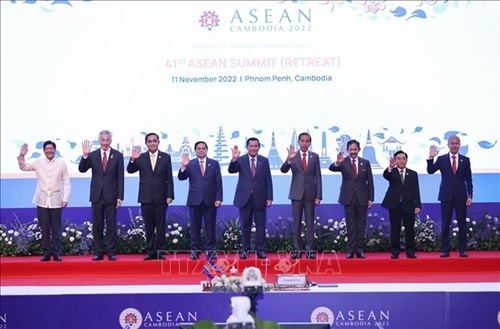The 41st summit focused on the bloc’s external relations, the regional architecture, and regional and international issues of common concern.
    |
 |
|
PM Pham Minh Chinh at the 41st ASEAN Summit |
In his remarks, PM Chinh underlined the uncertainty, instability, and unpredictability of the international and regional situation, with the emergence of traditional and non-traditional challenges, disrupted supply chains, inflation, energy and food security issues, complex developments of strategic competition among superpowers, as well as geopolitical changes.
He reaffirmed the importance of solidarity maintenance, internal strength promotion, a sense of responsibility, a balanced and objective approach, and persistence in the association’s principles, which have constituted the attractiveness of ASEAN as seen in partners’ willingness to enhance and upgrade cooperation with the bloc and in the partners’ full presence at this time’s summits.
To further augment the effectiveness of external relations, the PM called for increasing coordination with partners in common efforts to contribute to peace, security and development; consolidate the intra-bloc cohesion so that partners truly respect and support ASEAN’s centrality, and commit to long-term cooperation with the bloc through ASEAN-led mechanisms.
As the coordinator of the ASEAN - Republic of Korea relations, Vietnam will join other countries to develop these ties in an increasingly substantive and effective manner, he went on.
Regarding international and regional issues, PM Chinh emphasized that ASEAN should adopt a steadfast, skillful, harmonious, and balanced approach to hot issues in the region. He also shared the association’s viewpoints on the East Sea (South China Sea), Myanmar, and Russia - Ukraine conflict issues.
Together with other ASEAN leaders, the Vietnamese leader stressed the need to solidify ASEAN’s principled stance on the East Sea issue and asked for stronger cooperation in marine environment conservation, humanitarian assistance for fishermen and seafarers, and response to illegal fishing.
In his speech, he also appealed for continued persistence in the implementation of the Five-Point Consensus to help Myanmar, a member of ASEAN, to seek feasible and durable solutions to overcome difficulties. He voiced his support for adopting decisions about the Five-Point Consensus implementation to create an important basis for ASEAN to improve assistance for Myanmar.
The Government leader of Vietnam also underscored the need for proactive assistance, urging the parties concerned in Myanmar to show their sense of responsibility and goodwill cooperation to promote the effective and comprehensive implementation of the Five-Point Consensus for a future of stability and development in the country, the Myanmar people’s happiness and interests, as well as ASEAN’s solidarity, image, and reputation.
Sharing the common concern about the Russia - Ukraine conflict, PM Chinh highlighted the significance and value of peace and affirmed that respecting independence, sovereignty and territorial integrity is a fundamental principle of international relations and also a prerequisite for making international peace and security.
    |
 |
|
Head delegates posing for a joint photo |
At the summit, ASEAN leaders shared the view on fast and unpredictable changes of the geopolitical environment, strategic friction among superpowers, growing tensions in many hotspots, and complex developments of non-traditional security issues like disease outbreaks, natural disasters, climate change, and energy and food security, which have substantially affected countries in the region and ASEAN.
They stressed that more than ever, ASEAN needs to strengthen solidarity and self-reliance, take an overarching approach and strategic vision, responsibly contribute to the settlement of emerging challenges, and promote sustainable recovery and inclusive growth for the sake of people’s life and interest.
In terms of ASEAN’s external relations, the leaders applauded the substantive strides in the bloc’s cooperation with partners. They also highly valued the practical cooperation progams and projects with partners, which they said are important contribution to the ASEAN Community building and the formation of a favorable environment for peace, stability, and sustainable development.
Talking about such international and regional issues as the East Sea, Myanmar, the Korean Peninsula, and the Russia - Ukraine conflict, they affirmed countries’ responsibility for maintaining peace, security, and stability in the East Sea while stressing the importance of full and effective implementation of the Declaration on the Conduct of Parties in the East Sea (DOC), and efforts to soon finalize an effective and substantive code of conduct (DOC) in the waters that matches international law, including the U.N. Convention on the Law of the Sea (UNCLOS) 1982.
The leaders also voiced their concern about the Myanmar situation and that the Five-Point Consensus implementation has yet to make progress as expected.
They affirmed that Myanmar is an ASEAN member and agreed to continue helping the country overcome the current trying times, support efforts by the ASEAN Chair’s Special Envoy on Myanmar, and approve the decisions about the Consensus implementation.
Source: VNA